Wolfram Function Repository
Instant-use add-on functions for the Wolfram Language
Function Repository Resource:
Create a symbol for each named resource function
ResourceFunction["CreateResourceFunctionSymbols"][] defines a symbol for each named ResourceFunction in the "RF`" context. | |
ResourceFunction["CreateResourceFunctionSymbols"]["ctx`"] defines symbols in the given context. | |
ResourceFunction["CreateResourceFunctionSymbols"]["ctx`",{"name1","name2",…}] only defines symbols for the given names. | |
ResourceFunction["CreateResourceFunctionSymbols"]["ctx`",names,"op"] performs the operation specified by "op" on names. |
| OverwriteTarget | False | whether to redefine the target symbol if it already exists |
| ExcludedContexts | Automatic | a list of contexts that should be protected from changes |
| ResourceSystemBase | Automatic | the resource system to obtain names from |
| AllowUnknownNames | True | whether to set definitions for unknown resource names |
| "List" | list the symbols created |
| "Remove" | remove the symbols created |
| "Create" | equivalent to the two-argument form |
Create symbols for each resource function:
| In[1]:= |
| Out[1]= |
Use a resource function as a symbol:
| In[2]:= |
| Out[2]= | 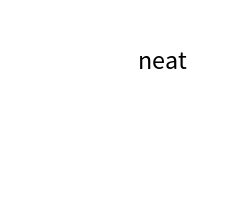 |
Specify the context:
| In[3]:= |
| Out[3]= |
Use a resource function from the new context:
| In[4]:= |
| Out[4]= |  |
Define a single resource function:
| In[5]:= |
| Out[5]= |
Use it:
| In[6]:= |
| Out[6]= | 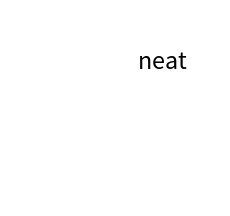 |
Define a specific set of resource functions:
| In[7]:= |
| Out[7]= |
Try them out:
| In[8]:= |
| Out[8]= |  |
List symbols created by CreateResourceFunctionSymbols:
| In[9]:= |
| Out[9]= |
Other symbols are not included in this list:
| In[10]:= |
| In[11]:= |
| Out[11]= |
Compare to Names:
| In[12]:= |
| Out[12]= |
Remove symbols created by CreateResourceFunctionSymbols:
| In[13]:= |
| Out[13]= |
Other symbols are not removed:
| In[14]:= |
| Out[14]= |
By default, existing symbols with definitions won't be redefined:
| In[15]:= | ![EmptyContext`BirdSay[expr_] := ResourceFunction["SpeechBubble"][Show[\!\(\*
NamespaceBox["LinguisticAssistant",
DynamicModuleBox[{Typeset`query$$ = "picture of a bird", Typeset`boxes$$ = RowBox[{
TemplateBox[{"\"birds\"",
RowBox[{"Entity", "[",
RowBox[{"\"Species\"", ",", "\"Class:Aves\""}], "]"}], "\"Entity[\\\"Species\\\", \\\"Class:Aves\\\"]\"", "\"species specification\""}, "Entity"], "[",
TemplateBox[{"\"image\"",
RowBox[{"EntityProperty", "[",
RowBox[{"\"Species\"", ",", "\"Image\""}], "]"}], "\"EntityProperty[\\\"Species\\\", \\\"Image\\\"]\""}, "EntityProperty"], "]"}], Typeset`allassumptions$$ = {{"type" -> "MultiClash", "word" -> "", "template" -> "Assuming ${word1} is referring to ${desc1}. Use \"${word2}\" as ${desc2}. Use \"${word3}\" as ${desc3}.", "count" -> "3", "Values" -> {{"name" -> "Species", "word" -> "bird", "desc" -> "a species specification", "input" -> "*MC.%7E-_*Species-"}, {"name" -> "Person", "word" -> "a bird", "desc" -> "a person", "input" -> "*MC.%7E-_*Person-"}, {"name" -> "WordData", "word" -> "", "desc" -> " referring to English words", "input" -> "*MC.%7E-_*WordData-"}}}}, Typeset`assumptions$$ = {}, Typeset`open$$ = {1}, Typeset`querystate$$ = {"Online" -> True, "Allowed" -> True, "mparse.jsp" -> 3.4309153, "Messages" -> {}}},
DynamicBox[ToBoxes[
AlphaIntegration`LinguisticAssistantBoxes["", 4, Automatic,
Dynamic[Typeset`query$$],
Dynamic[Typeset`boxes$$],
Dynamic[Typeset`allassumptions$$],
Dynamic[Typeset`assumptions$$],
Dynamic[Typeset`open$$],
Dynamic[Typeset`querystate$$]], StandardForm],
ImageSizeCache->{124.8, {9., 15.8}},
TrackedSymbols:>{Typeset`query$$, Typeset`boxes$$, Typeset`allassumptions$$, Typeset`assumptions$$, Typeset`open$$, Typeset`querystate$$}],
DynamicModuleValues:>{},
UndoTrackedVariables:>{Typeset`open$$}],
BaseStyle->{"Deploy"},
DeleteWithContents->True,
Editable->False,
SelectWithContents->True]\), ImageSize -> 75], expr, Scaled[.25]];](https://www.wolframcloud.com/obj/resourcesystem/images/b98/b9860187-4124-4890-ae6c-da23b8084935/6a6479ddc0968ff5.png) |
| In[16]:= | ![res = ResourceFunction["CreateResourceFunctionSymbols"][
"EmptyContext`", {"BirdSay", "PartyParrot", "SpeechBubble"}]](https://www.wolframcloud.com/obj/resourcesystem/images/b98/b9860187-4124-4890-ae6c-da23b8084935/4290580d78929cc5.png) |
| Out[16]= |
| In[17]:= |
| Out[17]= |
The definition is unchanged:
| In[18]:= |
| Out[18]= | 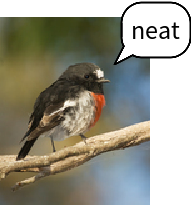 |
Overwrite any existing symbols:
| In[19]:= | ![ResourceFunction[
"CreateResourceFunctionSymbols"]["EmptyContext`", {"BirdSay", "PartyParrot", "SpeechBubble"}, OverwriteTarget -> True]](https://www.wolframcloud.com/obj/resourcesystem/images/b98/b9860187-4124-4890-ae6c-da23b8084935/2fa66b25a61eba82.png) |
| Out[19]= |
| In[20]:= |
| Out[20]= | 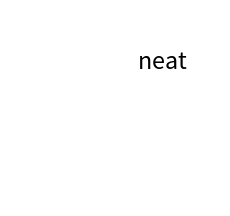 |
By default, some contexts are protected:
| In[21]:= |
| Out[21]= |
Override this protection (at your own risk):
| In[22]:= |
| Out[22]= |
| In[23]:= |
| Out[23]= |
| In[24]:= |
| Out[24]= |
By default, CreateResourceFunctionSymbol will allow defining symbols for names that are not recognized:
| In[25]:= |
| Out[25]= |
These symbols will fail at runtime if used before the corresponding ResourceFunction exists:
| In[26]:= |
| Out[26]= |
Use "AllowUnknownNames"->False to ensure that unrecognized names will cause a failure:
| In[27]:= | ![ResourceFunction[
"CreateResourceFunctionSymbols"]["MyContext`", "AlsoDoesNotExist", "AllowUnknownNames" -> False]](https://www.wolframcloud.com/obj/resourcesystem/images/b98/b9860187-4124-4890-ae6c-da23b8084935/26e6e1b79ba8ec90.png) |
| Out[27]= |
Define all resource functions from a particular category:
| In[28]:= | ![ResourceFunction["CreateResourceFunctionSymbols"]["WFP`", ResourceFunction["CategoryResourceFunctions"][
"Wolfram Physics Project", "Name"]]](https://www.wolframcloud.com/obj/resourcesystem/images/b98/b9860187-4124-4890-ae6c-da23b8084935/3e749d7ff0fd9e98.png) |
| Out[28]= |
| In[29]:= |
| Out[29]= |  |
| In[30]:= |
| Out[30]= | 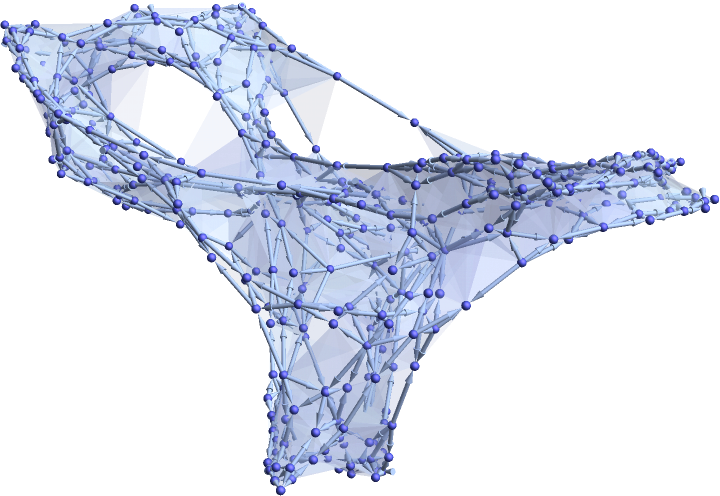 |
Create symbols in the current context to reference resource functions by their base name:
| In[31]:= |
Use the resource functions FoldRight, Stereogram3D and StringFunction:
| In[32]:= |
| Out[32]= |
| In[33]:= |
| Out[33]= | 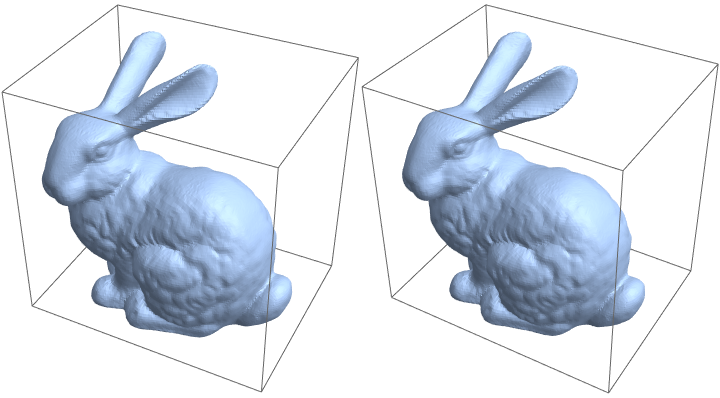 |
| In[34]:= |
| Out[34]= |  |
Get the list of created symbols:
| In[35]:= |
| Out[35]= |
| In[36]:= |
| Out[36]= |
Symbols that have already been created by CreateResourceFunctionSymbols are returned as Missing objects:
| In[37]:= | ![res = ResourceFunction["CreateResourceFunctionSymbols"][
"RedefineTest`", {"BirdSay", "PartyParrot", "SpeechBubble"}]](https://www.wolframcloud.com/obj/resourcesystem/images/b98/b9860187-4124-4890-ae6c-da23b8084935/31ac3b3c3f0eeaea.png) |
| Out[37]= |
| In[38]:= |
| Out[38]= |
| In[39]:= |
| Out[39]= |
User-created resource functions will also be included if they are discoverable by name:
| In[40]:= |
| Out[40]= |
| In[41]:= |
| In[42]:= |
| Out[42]= |
Create a resource function symbol:
| In[43]:= |
| Out[43]= |
Check the definition:
| In[44]:= |
| Out[44]= |  |
The definition changes after the symbol is used for the first time:
| In[45]:= |
| Out[45]= |
| In[46]:= |
| Out[46]= |
Locked symbols cannot be overwritten:
| In[47]:= |
| In[48]:= | ![res = ResourceFunction["CreateResourceFunctionSymbols"][
"AnotherContext`", {"BirdSay", "PartyParrot", "SpeechBubble"}, OverwriteTarget -> True]](https://www.wolframcloud.com/obj/resourcesystem/images/b98/b9860187-4124-4890-ae6c-da23b8084935/7c2410c97475a0be.png) |
| Out[48]= |
| In[49]:= |
| Out[49]= |
| In[50]:= |
| Out[50]= |
This work is licensed under a Creative Commons Attribution 4.0 International License